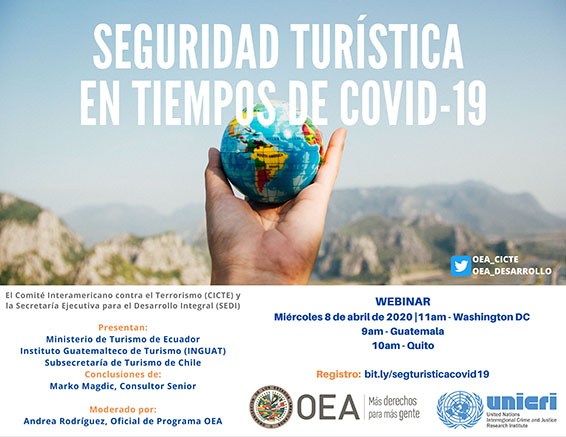

News
Tourism Security in Central America and the Caribbean: Enhancing the Response to the Covid Epidemic

Turin, 17 April 2020. Within the framework of the project Tourism Security in Central America and the Caribbean, funded by the Government of Canada, and implemented by UNICRI and the Organization of American States (OAS), a Webinar on Tourism Security in times of COVID was organized on 8 April 2020. The Webinar was attended by 300 participants.
The Webinar served as an occasion to discuss the unprecedented challenges faced by the Member States in managing the global Covid-19 crisis within the tourism sector and to understand which policies and practices they have been adopting to ensure the safety and the security of those tourists visiting their countries while the crisis has been rapidly evolving.
The panellists of this Webinar, comprising of representatives from Ecuador and Guatemala, direct beneficiary countries of the project, explained how the tools developed during the implementation of the project were instrumental to support them in the management of such a challenging situation. In particular, the adoption of a Tourism Security Strategy envisaging enhanced cooperation among public entities and with the private sector, as well as the establishment of a crisis management unit and a communication plan, helped them in addressing the overall critical situation.
Most importantly, the Webinar was an occasion to exchange practical solutions and to be an inspiration for other Governments and practitioners.
UNICRI and OAS are glad to promote other webinars on this topic involving different Member States, international organizations and relevant stakeholders to further promote international cooperation and mutual learning during this global emergency.
The project Tourism Security in Central America and the Caribbean has been implemented by UNICRI and the OAS over a period of three years.
During the implementation of the project 16 tourist destinations were visited in 11 countries of the Caribbean, Central America and Mexico, providing two different types of training: Basic Tourism Security Workshops and Risk Management for Tourism Destinations, and assisting some of them in the development of Tourism Security Plans. Over 800 representatives from the public and the private sectors participated in the trainings and working meetings, all of them holding an important role within the tourism industry in their country.
As a result of these years of intensive research, capacity building and dialogue with the beneficiary Member States, as well as a network of practitioners have been created in the Region, generating a common vision and producing key findings and recommendations to further protect the tourism sector. Some of these recommendations adopted were indeed helpful to address various challenges of the Covid Emergency.
In particular the following ones were recognized as particularly relevant in this situation:
Enhance prevention and resilience
Establish a tourism security coordination mechanism
Develop a tourism safety and security strategy plan
Do not plan for everything but be ready for anything
Value your successful experience, adopt a step-by-step approach
Optimize your resources, consolidate your practices
Exchange best practices, also with your competitors
Effective communication means enhancing security
Value public-private cooperation
Always include the local community.
Promote social corporate responsibility
Invest in public transportation and medical emergencies

Turin, 17 April 2020. Within the framework of the project Tourism Security in Central America and the Caribbean, funded by the Government of Canada, and implemented by UNICRI and the Organization of American States (OAS), a Webinar on Tourism Security in times of COVID was organized on 8 April 2020. The Webinar was attended by 300 participants.
The Webinar served as an occasion to discuss the unprecedented challenges faced by the Member States in managing the global Covid-19 crisis within the tourism sector and to understand which policies and practices they have been adopting to ensure the safety and the security of those tourists visiting their countries while the crisis has been rapidly evolving.
The panellists of this Webinar, comprising of representatives from Ecuador and Guatemala, direct beneficiary countries of the project, explained how the tools developed during the implementation of the project were instrumental to support them in the management of such a challenging situation. In particular, the adoption of a Tourism Security Strategy envisaging enhanced cooperation among public entities and with the private sector, as well as the establishment of a crisis management unit and a communication plan, helped them in addressing the overall critical situation.
Most importantly, the Webinar was an occasion to exchange practical solutions and to be an inspiration for other Governments and practitioners.
UNICRI and OAS are glad to promote other webinars on this topic involving different Member States, international organizations and relevant stakeholders to further promote international cooperation and mutual learning during this global emergency.
The project Tourism Security in Central America and the Caribbean has been implemented by UNICRI and the OAS over a period of three years. During the implementation of the project 16 tourist destinations were visited in 11 countries of the Caribbean, Central America and Mexico, providing two different types of training: Basic Tourism Security Workshops and Risk Management for Tourism Destinations, and assisting some of them in the development of Tourism Security Plans. Over 800 representatives from the public and the private sectors participated in the trainings and working meetings, all of them holding an important role within the tourism industry in their country. As a result of these years of intensive research, capacity building and dialogue with the beneficiary Member States, as well as a network of practitioners have been created in the Region, generating a common vision and producing key findings and recommendations to further protect the tourism sector. Some of these recommendations adopted were indeed helpful to address various challenges of the Covid Emergency. In particular the following ones were recognized as particularly relevant in this situation: |



